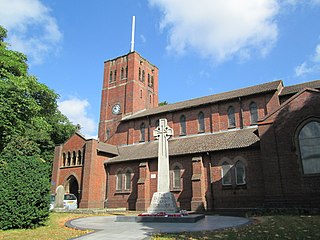
The temperance movement is a social movement promoting temperance or complete abstinence from consumption of alcoholic beverages. Participants in the movement typically criticize alcohol intoxication or promote teetotalism, and its leaders emphasize alcohol's negative effects on people's health, personalities and family lives. Typically the movement promotes alcohol education and it also demands the passage of new laws against the sale of alcohol, either regulations on the availability of alcohol, or the complete prohibition of it. During the 19th and early 20th centuries, the temperance movement became prominent in many countries, particularly in English-speaking, Scandinavian, and majority Protestant ones, and it eventually led to national prohibitions in Canada, Norway, Finland, and the United States, as well as provincial prohibition in India. A number of temperance organizations exist that promote temperance and teetotalism as a virtue.

Rowley Regis is a town and former municipal borough in Sandwell in the county of the West Midlands, England. It encompasses the three Sandwell council wards of Blackheath, Cradley Heath and Old Hill, and Rowley. At the 2011 census, the combined population of these wards was 50,257.

Burmantofts is an area of 1960s high-rise housing blocks in inner-city east Leeds, West Yorkshire, England adjacent to the city centre and St. James's Hospital. It is a racially diverse area, with sizable Afro-Caribbean and Irish communities, but suffers the social problems typical of similar areas across the country.

Hope UK is a United Kingdom Christian charity based in London, England which educates children and young people about drug and alcohol abuse. Local meetings started in 1847 and a formal organisation was established in 1855 with the name The United Kingdom Band of Hope Union.

Cradley Heath is a town in the Rowley Regis area of the Metropolitan Borough of Sandwell, West Midlands, England approximately 2 miles (3 km) north-west of Halesowen, 3 miles (5 km) south of Dudley and 8 miles (13 km) west of central Birmingham. Cradley Heath is often confused with the neighbouring Halesowen district of Cradley, although the two places are separated by the River Stour and have long been in separate local authorities, and until 1966 were in separate counties.
Events from the year 1847 in the United Kingdom.
Tunnicliffe or Tunnicliff is a surname, and may refer to:
Benjamin Lucraft was a famous craftsman chair-carver in London where his radical inclinations led him to be involved in many political movements.

Cradley Heath Baptist Church, also known as Four-ways Baptist Church, was the first Church of any denomination to build a chapel in Cradley Heath, West Midlands. The first meeting was in December 1833, in Grainger's Lane. Later, land was bought near the Four-Ways end of the High Street, and a meeting place was built. The site was expanded, and two further buildings were built, the last in 1904.
Jabez Burns was an English nonconformist divine and Christian philosophical writer. He was one of the first clergymen of any denomination to preach teetotalism from the pulpit.
Dawson Burns (1828–1909) was an English Baptist minister and temperance activist.

Rev. George Cosens (1805–1881) is the "first reported West Indian minister to hold a pastorate in Britain." He originated from Jamaica, and lived most of his life in Britain having moved to London to study and joining the Primitive Methodists in his late teens. After working as a Primitive Methodist preacher, he joined the Baptists and from 1837 served as a minister in various Baptist churches. He died in working retirement in 1881. George Cosens married twice, Mary Burnet, 1830, and being widowed, Betsy Dancer in 1841. He is buried in the cemetery of Brierley Hill Baptist Church.
The temperance movement in the United Kingdom was a social movement that campaigned against the recreational use and sale of alcohol, and promoted total abstinence (teetotalism). In the 19th century, high levels of alcohol consumption and drunkenness were seen by social reformers as a danger to society's wellbeing, leading to social issues such as poverty, child neglect, immorality and economic decline. Temperance societies began to be formed in the 1830s to campaign against alcohol. Specific groups were created over periods of time dedicated to the different aspects of drinking. For example, in 1847, the Band of Hope was created to persuade children not to start drinking alcohol. Most of these temperance groups were aimed at the working class. Temperance was also supported by some religious groups, particularly the Nonconformist Churches. Although the temperance movement met with local success in parts of Britain, it failed to impose national prohibition, and disappeared as a significant force following the Second World War.
Charles Henry Sitch was Labour MP for Kingswinford.

Thomas Scales (1786–1860) was a leading British abolitionist. He was the first minister of Queen Street Chapel in Leeds and he founded the Silcoates School.
George Stonehouse was a Baptist minister in South Australia, founder of the LeFevre Terrace Baptist Church, North Adelaide, and first president of Adelaide Theological College.
Anne Jane Carlile was an Irish temperance pioneer and philanthropist, and one of the first women involved in the temperance movement in Great Britain and Ireland.

Thomas Jackson (1783–1873), was an English Wesleyan minister and writer who acted as chair of divinity of the Richmond Theological College and president of the Methodist Conference during the mid-nineteenth century.

Samuel Warren (1781–1862) was a Wesleyan Methodist minister, who formed a breakaway group of "Warrenites", and in later life was an Anglican priest.

Beckett Street Cemetery is a closed cemetery in Burmantofts, Leeds, West Yorkshire, England. Founded in 1842, the site was officially opened in 1845 and is recognised as being one of England's first municipal burial sites,. Although the cemetery was closed to interments in 2001, it remains open for visitors, and has two listed structures besides being a listed park itself.











